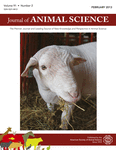-
Views
-
Cite
Cite
H. W. Liu, D. W. Zhou, Influence of pasture intake on meat quality, lipid oxidation, and fatty acid composition of geese, Journal of Animal Science, Volume 91, Issue 2, February 2013, Pages 764–771, https://doi.org/10.2527/jas.2012-5854
Close - Share Icon Share
ABSTRACT
This study was conducted to investigate the influence of pasture intake on meat quality, lipid oxidation, and fatty acid composition of geese. One hundred twenty Dongbei White male geese (a local breed; BW = 878 ± 13 g; 28 d old) were randomly and equally divided into 2 treatments with 6 pens of 10 geese per treatment. The 2 treatments consisted of birds fed ad libitum a corn-based feed. One-half of the birds had no access to pasture (control) while the other half had access to an alfalfa (Medicago sativa)-based pasture (pasture). The study lasted 42 d. Body weight and feed intake were recorded weekly. At the end of the study, geese were slaughtered to collect meat samples. Results showed that pasture intake reduced subcutaneous fat thickness (P < 0.05) and abdominal fat yield (P < 0.05) of geese compared with control. Geese with access to pasture had greater cooking loss (P < 0.05) and lightness (L*) value (P < 0.05) and lower pH at 24 h postmortem (pH24; P < 0.05) and thiobarbituric acid reacting substance values (P < 0.05) at 0 and 30 min of forced oxidation. Moreover, pasture intake increased linolenic acid (C18:3n-3; P < 0.05) and eicosapentaenoic acid (C20:5n-3; P < 0.05) and reduced the n-6:n-3 ratio (P < 0.05) in the breast muscle of geese compare with the control. In conclusion, pasture intake did not enhance growth performance but improved carcass characteristics and meat quality and changed fatty acid composition of geese.





